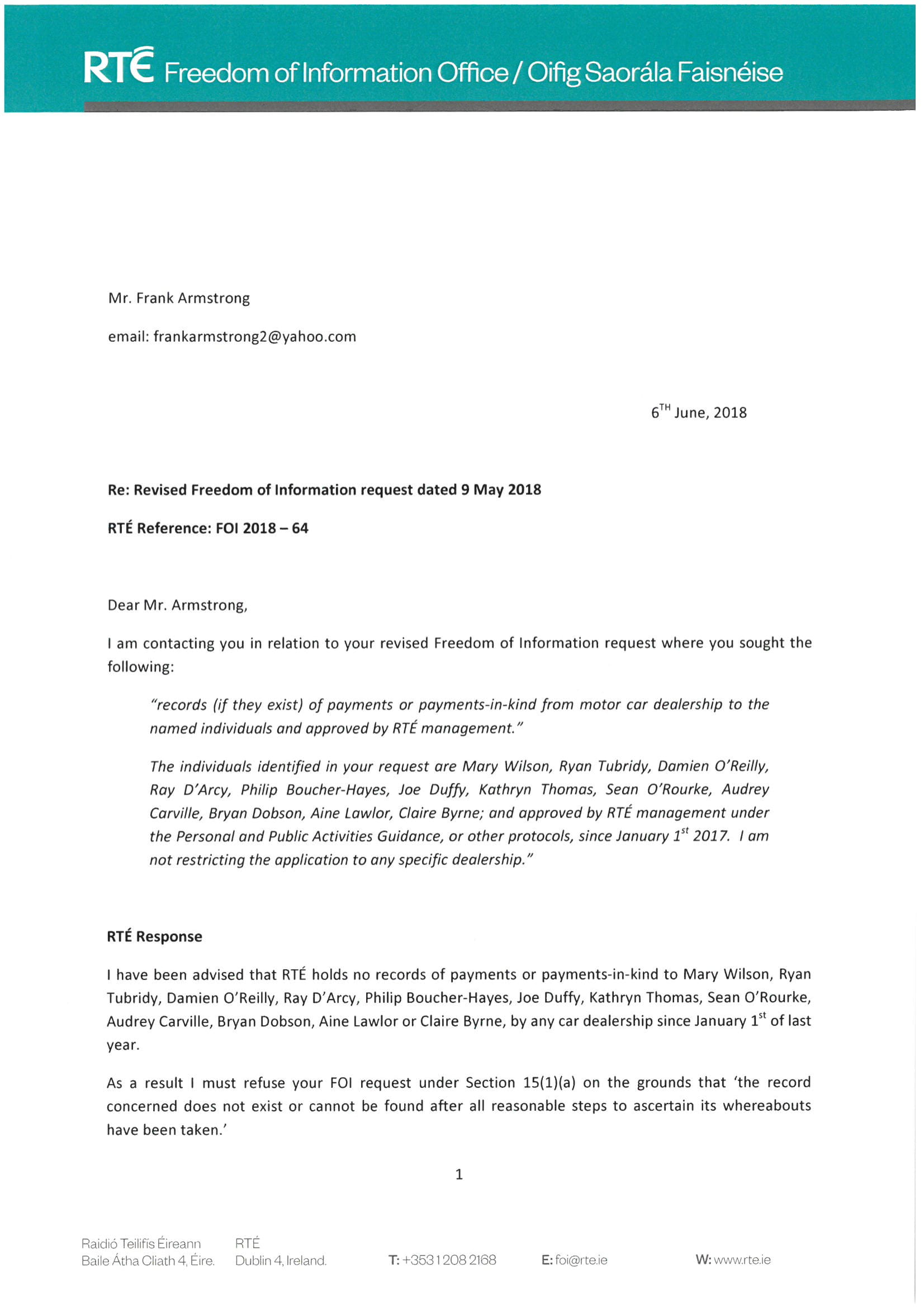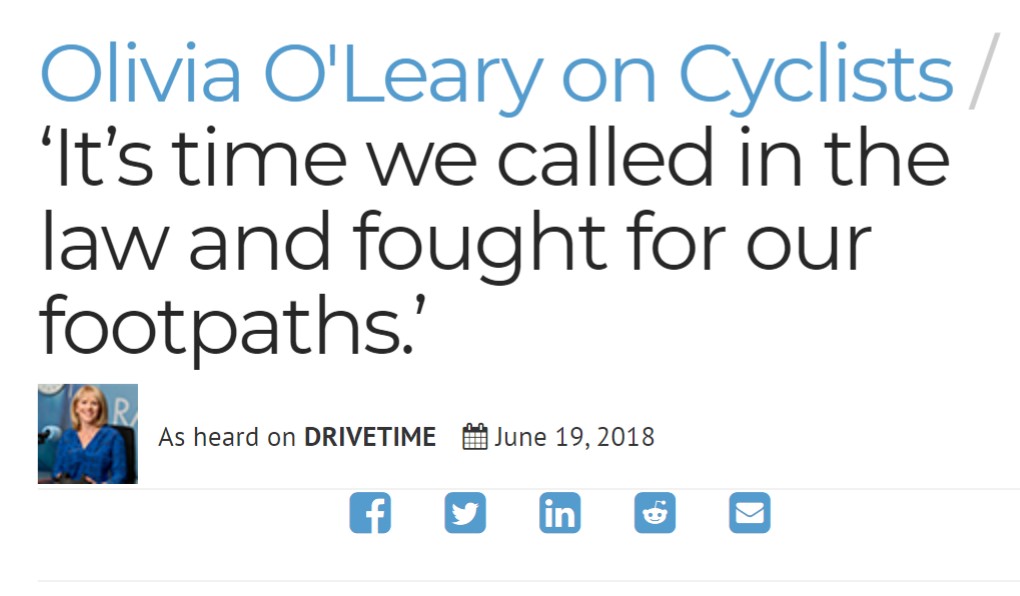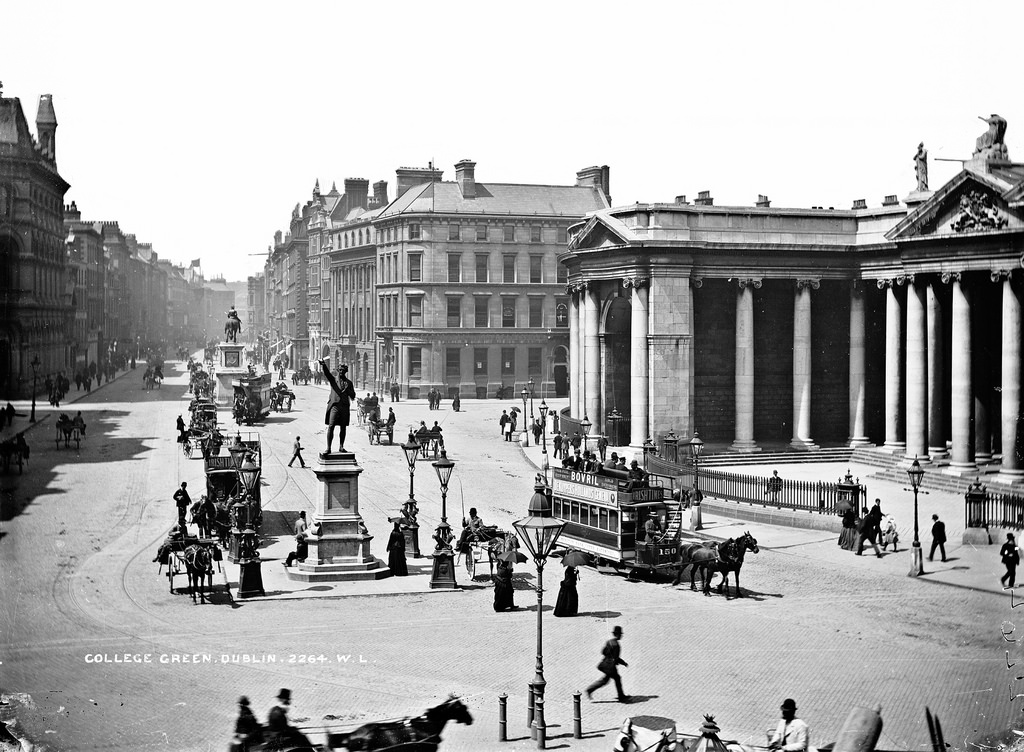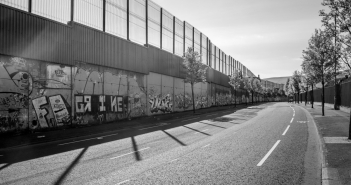One trail runs dry, but a scent hangs in the air. Pursuant to Stephen Court’s Drivetime article for Cassandra Voices deconstructing the Irish media’s – including RTÉ ’s – relationship with the motor car sector, I lodged a Freedom of Information (FOI) request with the national broadcaster.
I sought records of payments, or payments-in-kind, from car dealership to leading RTÉ stars, approved by RTÉ ’s management since January 1st, 2017 under the Personal and Public Activities Guidance.
RTÉ’s FOI officer responded on June 6th to say there was no record of any such payments or payments-in-kind.

So can we be sure that RTÉ ’s ‘star’ personalities are appropriately objective in their reporting on transport issues?
Unfortunately not, as an FOI is a request for records containing information, rather than the information itself. According to a recent judgment (quoted by RTÉ’s FOI Officer): ‘If the record does not exist the body concerned is not required to create records to provide the information sought’ (Case 170505, Ms X and Louth County Council).
In other words, the FOI officer is under no obligation to dig for information on behalf of an applicant if the question posed misses records containing the targeted information; albeit an officer must take reasonable steps to comply with a request, which usually takes thirty days.
There is ample evidence of a permissive culture among RTÉ management towards employees’ earnings from third party sources. This was revealed in another FOI application I took earlier this year, unrelated to enquiries into the motor sector. But RTÉ’s officer chose to withhold details of who received what from whom – for reasons of commercial sensitivity.
As long as the national broadcaster does not provide a publicly accessible register of all transactions between employees (including so-called ‘external employees’ who avail of tax breaks available to companies) with third parties, as the BBC does, then suspicion lingers.
At the very least the national broadcaster should reveal the text of the Personal and Public Activities Guidance, which regulates employee’s third party relationships.
Any media organisation in receipt of a disproportionate proportion of its advertisement revenue from a particular sector is exposed to a charge of bias, which may operate in subtle ways.
II – Bring Cyclists to Justice
A recent example of what appears to be ‘Groupthink’ in the national broadcaster came from the unlikely source of Olivia O’Leary on – you guessed it – her weekly Drivetime column on June 19th.
Drivetime’s website adopts the incendiary title: ‘Olivia O’Leary on Cyclists: ‘It’s time we called in the law and fought for our footpaths’. It is a case of ‘we’, the ‘normal’ people, presumably motorists, ranged against ‘them’, that strange species of two-wheeled fanatics, invading ‘our’ footpaths. The title invites confrontation beyond legal enforcement.

The column itself is more balanced than the title suggests, but contains serious lapses of judgment. O’Leary said she was in favour of banning cars from between the canals and acknowledged that ‘cars destroy a city’, but then proceeded to lambaste the behaviour of cyclists in Dublin’s city centre.
She limits her complaint to a certain type of (male) cyclist on a Dublin bike ‘thundering along’ footpaths, but that nuance is lost in the following statement:
But, you know, there is one thing that private cars, for all their faults, usually do not do. They do not drive down the middle of the footpath, scattering pedestrians left and right. Cyclists, on the other hand, do this all the time.
O’Leary also, remarkably, jokes about using an umbrella to unseat any cyclist who engages in ‘Panzer tank stuff’, before adding that she would not actually recommend this. Ha ha ha. Hopefully some hot head has not had ideas put in his head.
This seems particularly insensitive, to put it kindly, considering how that very week in June ten people including three pedestrians had been killed by motor vehicles. Two were hit-and-runs. Unlike those killers, O’Leary missed the real culprits.
Moreover, as Cian Ginty points out in a column for Irishcycle.com, a simple Google search yields examples of pedestrians on footpaths being killed by motorists.
O’Leary is relating her personal experiences as a pedestrian in Dublin, which is fair enough, and of course there are lunatics out there. But what she fails to acknowledge is that friction between pedestrians and cyclists is largely a product of the deficient cycling infrastructure in the capital.
Mounting the footpath in Dublin’s centre is often a safety measure in a crush of buses, taxis and private cars. Most cyclists will then glide at the pace of the average pram, and give right of way to pedestrians, some of whom, nonetheless, will take the opportunity to scream into the cyclist’s ear.
O’Leary should have known better than to target cyclists for long failures in urban planning. She also ought to be pissed off with how the Drivetime producers have distorted her column.
III – Motor Mouths
Transparency in terms of external payments and gifts is especially important where, as Stephen Court’s article illustrates, there is a record of high profile figures – including Ryan Tubridy and others – apparently receiving free cars from dealerships, and also where numerous programmes from Drivetime to Liveline are sponsored by car companies, who also dominate commercial breaks.
If a presenter’s salary is linked to the advertising revenue his or her programme attracts this could be seen as an indirect payment, which might inhibit the expression of views unsympathetic to the sponsor. At the very least large scale advertising by any sector creates an objective bias, i.e. an appearance of bias, even without direct evidence.
No doubt these are existential questions for a state broadcaster, whose business model relies on advertising revenues of €151.5 last year, along with TV €186.1 million in licence fees.
One of the reasons I say that we have to have our numbers up [is]because it only works when the numbers are up.
Joe Duffy, Irish Times, Saturday, December 9th, 2017.
Is a widespread devotion to ratings really a pursuit of advertising revenue? With RTÉ consistently losing money (€5.6 million last year), it is time to cut its cloth, and focus on its primary public service: the delivery of news and current affairs at a remove from vested interests.
This should involve an end to exorbitant salaries. The country is awash with aspiring journalists, most of whom would happily work on an average RTÉ salary of €70,000 per annum.
The BBC manages to perform this role satisfactorily in the UK, while allowing commerical competitors. The population might be more willingly pay their TV licenses if the broadcaster delivered a better service. The country has among the highest evasion rates in Europe.
It is time to kill the radio star on the national broadcaster.
IV – A Broader Malaise
The extent of payments from external sources to RTÉ’s household names was revealed in another FOI application I took earlier this year. But the officer refused to divulge precise details, claiming this could be advantageous to competitors, might result in financial loss to contractors, and potentially ‘prejudice RTÉ ’s contractual negotiations in respect of future engagements with independent contractors’.
I saw details of payments by third parties to Ryan Tubridy, Ray D’Arcy, Miriam O’Callaghan, Damien O’Reilly, Marty Morrissey, Claire Byrne, Bryan Dobson, Sean O’Rourke, Joe Duffy, Philip Boucher-Hayes, Joe Duffy, Kathryn Thomas, Mary Wilson and Marian Finucane
The officer responded that for 2017, ‘the total number of requests to engage in external ventures that RTÉ received was 122. Of that number, 114 were approved and 8 were refused. Of those granted, 97 were independent contractor requests and 1 was a RTÉ employee request. Of those refused, 7 were independent contractor requests and 17 were RTÉ employee requests.’
That the vast majority of requests were approved in 2017, particularly to independent contractors, shows the organisation takes a liberal view on potential conflicts of interest. Indeed, it is a matter of public record that management approved a payment by Origin Green/Bord Bia to Damien O’Reilly last year despite an obvious conflict of interest.

RTÉ’s Damien O’Reilly.
RTÉ claimed the majority of payments were for ‘non-commercial events, and mostly in support of charitable or other not-for-profit organisations’. In the absence of further details, however, it is impossible to verify this claim. It begs the question: if the work is harmless, or even benign, why did they withhold the information? Bord Bia is a not-for-profit semi-state body, but there was still a conflict of interest for RTÉ’s main agricultural correspondent to be receiving money from that organisation.
We cannot now tell whether any of the third parties have connections to the motor car industry in Ireland. And even if an organisation is charitable, or not-for-profit, this does not imply neutrality on contentious issue.
The claim that divulging information would “prejudice RTÉ ’s contractual negotiations” suggests the likes of Ryan Tubridy – who has been outspoken in his criticism of cyclists – could be lost to commercial competitors if damaging information enters the public domain.
That contention may be questioned, in the case of Tubridy at least. After moonlighting with the BBC in 2016 Tubridy admitted he found connecting with UK listeners difficult, while leaving for Newstalk or TV3 would represent a career regression.
Most of RTÉ ’s household names found fame, and fortune, through extended exposure on RTÉ. The failure of Pat Kenny to draw a substantial number of his former listeners away from the station, when he departed for Newstalk, indicates most people are in the habit of tuning into the state broadcaster, rather than the radio ‘star’.
V – A Tool of the Sector
The state broadcaster is certainly not alone in the Irish media in its reliance on advertising from the motor car industry, and the objective bias this brings. Our ‘paper of record’, the Irish Times, seems to do little investigative work into subject-matters impinging on its leading advertisers; and while generally virtue-signalling in its approval of cycling, has also contributed to negative stereotyping.
One such portrayal came from Fintan O’Toole in 2013. O’Toole, whose father was a bus driver, as he has reminded his readers, does not drive. But seemingly that does not extend to sympathy for cycling. During National Bike Week in 2013 he wrote, tongue-in-cheek, that cyclists were the ‘spawn of the devil’, no doubt to the guffaws of his colleagues on the editorial floor.
But the article was actually a genuine indictment of the behaviour of cyclists, who are portrayed as casually mounting footpath and endangering pedestrians, even where they have been provided with their own lanes.
As with Olivia O’Leary, O’Toole posited a false dichotomy between pedestrians and cyclists, ‘us’ and ‘them’, which ignores how the problem is not with either form of locomotion, but the utter dominance of the motor car in Ireland’s urban areas.
Many of Dublin’s cycle lanes are defective: the track might be potholed, or simply a part of the road that is coloured red, a simulacrum of a real cycle lane without a protective curb, where parking is often permitted outside rush hour.
O’Toole recently wrote an article criticising plans to remove motorized traffic from College Green, a measure which would also be advantageous to cyclists. O’Toole’s argument was that this would work to the detriment of mostly working class bus passengers. Cycling is not mentioned once in the article.

College Green c.1890.
The implication is that cycling is not a realistic mode of transport for the working class, but instead the preserve of middle class, lycra-clad, fitness enthusiasts, which is certainly not the case in cities where the bike is king. O’Toole is right insofar as he draws attention to the poor provision of public transport in Dublin, and to emphasise the continued importance of the bus.
But rather than abandoning plans for a plan that would make the centre of the city more accessible to pedestrians and cyclists, a better outcome would be investment in quality bus corridors and the introduction of radial routes.
*******
With a climate comparable to Copenhagen’s and Amsterdam’s, Dublin is regarded as the Great Bike Hope of Emerging Bicycle Cities. But the media, from state broadcaster to the national ‘paper of record’ have failed to drive home that message, and few politicians, beyond the Green Party, have consistently campaigned on behalf of cycling, which should be a viable and healthy alternative for most healthy urbans residents.
A deficient cycling infrastructure is another blot on the copy book of a country ranked second worst in Europe for tackling Climate Change, and which confronts an obesity pandemic.
The national broadcaster might insulate itself from claims of objective bias by not treating news and current affairs as cash cows. Then we might be offered better reporting on important issues, such as reforming a sclerotic transport infrastructure. And if RTÉ’s ‘stars’ reckon they are not being paid well enough, they should be told to get on their bikes.




